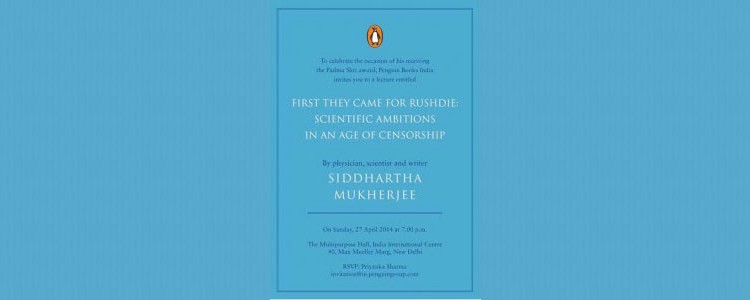Timur Vermes, “Look Who’s Back”
Timur Vermes debut novel Look Who’s Back is about Adolf Hitler returning to Berlin, 2011. It is written in first person. Adolf Hitler is who he says he is, but others mistake him for an actor who is method acting. Through a series of twists and turns, Adolf Hitler becomes a part of a satirical television show. The ratings of the show rise tremendously and Hitler wins the Adolf Grimme Prize–the top prize for television comedy. Everyone involved with the programme is ecstatic with joy. Fraulein Kromeier is deputed to work for Hitler, as a secretary. They get along well. In fact she is proud to be working with a real star, till her grandmother ticks her off:
‘What that man does is not funny. It’s nothing to laugh about. We can’t have people like that around.’ And I’m like, ‘But Nan, it’s satire? He’s doing it so it doesn’t happen again?’ But she’s like, ‘That’s not satire. He’s just the same as Hitler always was. And people laughed then, too.’
Fraulein Kromeier discovers that her Nan’s family had been gassed during the war.
Hitler is offended by the criticism of his “life’s work”. He decides to defend himself by taking the “path of eternal, unadulterated truth”.
“Fraulein Kromeier,” I began. “I don’t imagine that you’ll thank me for saying this, but you are mistaken in many things. The mistake is not yours, but it is a mistake all the same. These days people like to assert that an entire Volk was duped by a handful of staunch National Socialists, unfaltering to the very end. And they’re not entirely wrong; an attempt did in fact take place. In Munich, 1924. But if failed, with bloody sacrifices. The consequence of this was that another path was taken. In 1933 the Volk was not overwhelmed by a massive propaganda campaign. A Fuhrer was elected in a manner which must be regarded as democratic, even in today’s understanding of the word. A Fuhrer was elected in a manner which must be regarded as democratic, even in today’s understanding of the word. A Fuhrer was elected who had laid bare his plans with irrefutable clarity. The Germans elected him. Yes, including Jews. And maybe even your grandmother’s parents. In 1933 the party could boast four million members, after which time we accepted no more. By 1934 the figure might otherwise have been eight million, twelve million. I do not believe that any of today’s parties enjoy anything approaching this support.”
“What are you trying to say?”
“Wither there was a whole Volk full of bastards. Or what happened was not the act of bastards, but the will of the Volk.”
Fraulein Kromeier looked at me in disbelief. “You …can’t say that! It wasn’t the will of the people that my nan’s family should die! Come off it, it was the idea of those who were found guilty. In, what’s it called, in …Nuremberg.”
“Fraulein Kromeier, I beg you! This Nuremberg spectacle was nothing more than a deception, a way to hoodwink the Volk. If you are seeking to find those responsible you ultimately have two options. Either you follow the line of the N.S.D.A.P., and that means the man responsible is precisely the one who bears responsibility in the Fuhrer state — i.e. the Fuhrer and no one else. Or you must condemn those who elected this Fuhrer, but failed to remove him. They were very normal people who decided to elect an extraordinary man and entrust him with the destiny of their country. Would you outlaw elections, Fraulein Kromeier?”
( p. 292-4)
Look Who’s Back is a chilling and at the same time hilarious novel. As Die Ziet says, “shockingly plausible” too. According to Wikipedia, Timur Vermes was a professional ghostwriter and Er ist wieder da is his first novel. It has been a bestseller in Germany, selling over 1.3 million copies. The film rights have been sold. Translation rights have been sold to 35 countries.
It is interesting to have a novel revolve around the Adolf Hitler in modern Germany, given that his manifesto Mein Kampf is not easily accessed in the country. To read it, you require special permission and is only available in libraries. But in 2015 the state of Bavaria will allow the publication of the book in Germany for the first time since the Second World War. According to a report in the Independent, “The state owns the copyright for the book and had blocked all attempts to publish a new German language edition because of fears that it would encourage a resurgence of the far right. However, the copyright, which transferred to the state of Bavaria after the Nazi party’s publishing house Eher Verlag was liquidated in 1945, expires next year.
Plans to republish the book with an academic commentary early in 2016 were approved in 2012, but last December the idea was blocked following complaints from Holocaust survivors. Bavaria then declared that the book was “seditious” and should never appear in print in German.
However, the state has now revised its ruling. “We have changed our minds,” said Ludwig Spaenle, the Bavarian Minister of Culture, …. He said Bavaria would not oppose the project because it was in the interests of “freedom of science”.” ( http://www.independent.co.uk/news/world/europe/mein-kampf-legalised-bavaria-drops-veto-on-german-edition-of-adolf-hitlers-manifesto-9081339.htm . 23 Jan 2014)
With his experience as a ghostwriter, Timur Vermes, has created a story with a fine balance between fact and fiction. This is a novel that must be read, especially at a time when we are surrounded by conflicts world over.
Timur Vermes Look Who’s Back ( Translated from the German by Jamie Bulloch) Maclehose Press, an imprint of Quercus, London, 2014. Pb. pp. 380 Rs 499
31 July 2014









